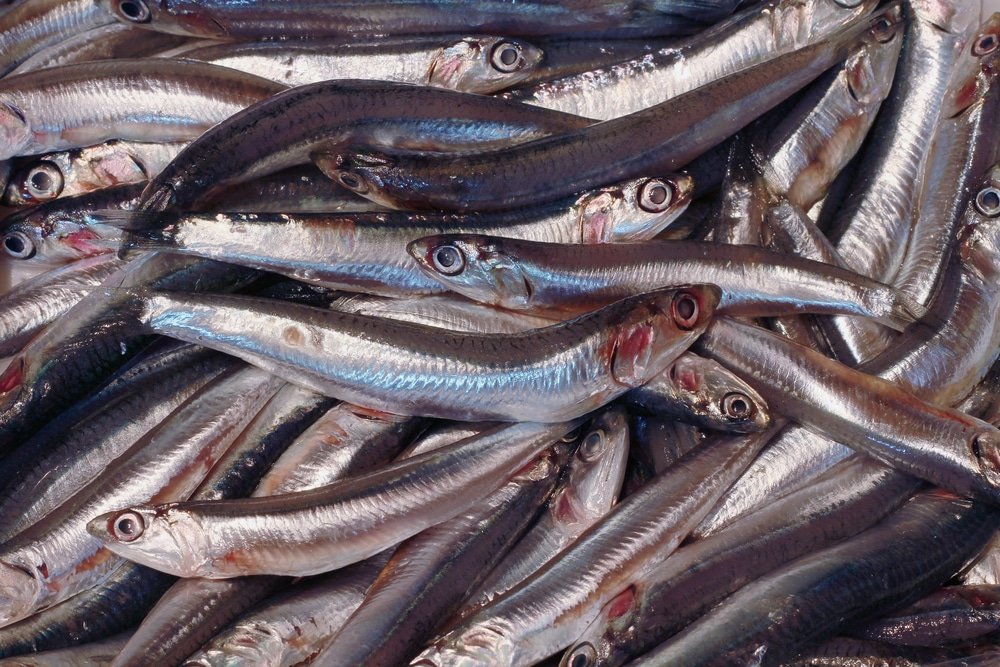The Mediterranean diet is not extremely popular around the world but has been followed for centuries by people living in the countries around the Mediterranean Sea. These include people living in countries such as Italy, Greece, Cyprus, Malta and to a lesser extent other countries bordering the sea such as Spain and France.
The most well-known reincarnations of the diet are associated with the Greek or Italians, whose diet to this day shares strong similarities to the diet as it was centuries ago. It is also important to note that there is no one singular “true” Mediterranean diet, as cuisine from region to region will vary based on what is natively grown in the country.
Regardless, more people outside of the Mediterranean regions are actively doing their best to adopt a Mediterranean-style diet, even though they tend to make their own modifications.
Let’s check what makes the Mediterranean diet so special:
Why The Interest In The Mediterranean Diet?
Interest in the Mediterranean diet spread quickly in the 1960s when a team of North American researchers observed exceptionally low rates of heart disease in persons living in regions that followed a Mediterranean-style diet, and their general longevity, compared to regions that typically consumed the standard Western diet.
It is important to realize that the Mediterranean diet isn’t necessarily a diet per se since the people living in these regions just consider it normal food. No real restrictions, but lots of really high-quality foods that also support overall health and well-being.
The Basic Principles Of The Mediterranean Diet
Meals following Mediterranean diet principles are very rich and colorful. It is not uncommon to have fatty fish, along with carrots, grapes, olives, figs and yogurt all in one sitting, which means that hunger should not be an issue for you.
The Mediterranean diet should not be considered low-fat by any stretch, even though you will not be regularly indulging in foods such as red meat or processed and packaged cuts. Pasta is also extremely common, which seems to have of originated in Italy.


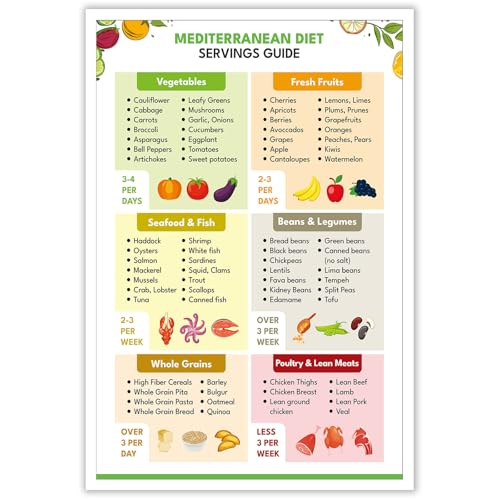
Love wine? Then you’re in luck. The Mediterranean diet also approves of red wine, known for its high antioxidant content and heart-healthy properties.
Health Benefits Of The Mediterranean Diet
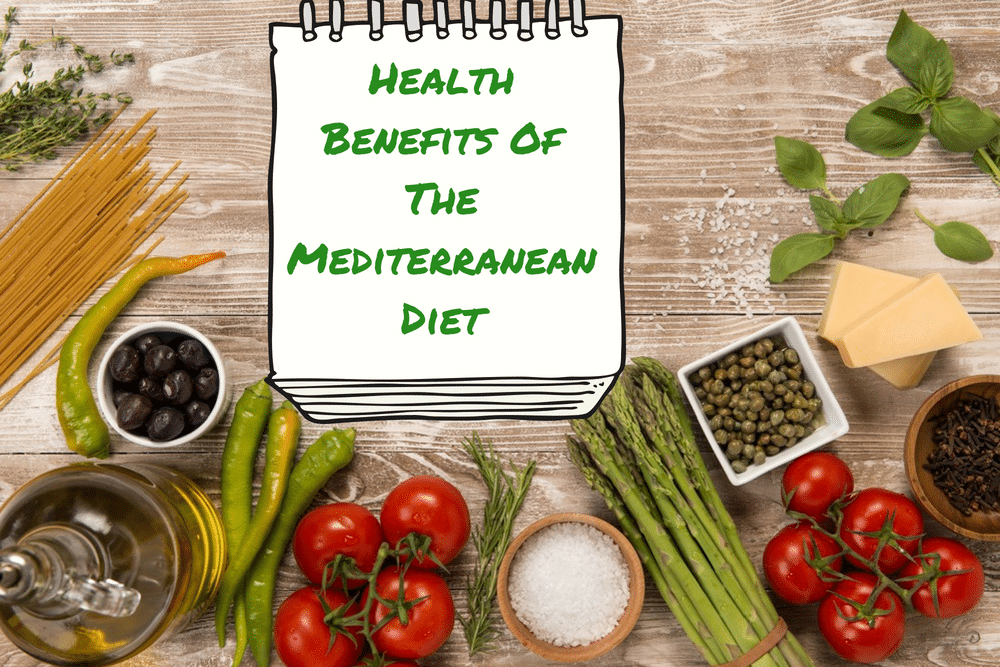
Why the growing interest in the Mediterranean diet? The typical Western diet places heavy emphasis on convenience, adding in foods that offer little nutritive value but take mere minutes to prepare. Of course, manufacturers have profits to look at as their bottom line, which means that as a result, our health often pays the price.
The Mediterranean diet brings us back to a state of natural eating, containing foods full of unbridled nutrition. Common health benefits associated with consumption of a Mediterranean-style diet include:
1. Improved Heart Health
It was interesting for researchers to find out that persons living in poorer southern Italy possessed superior cardiovascular health markers[R] than people living in highly affluent neighborhoods of New York City. This socio-economic finding was what peaked interest in the Mediterranean diet in the first place.
The consumption of lower amounts of red meat, processed sugars, as well as the greater amount of monounsaturated fats and a wider variety of fruits and vegetables was attributed to this finding, especially coupled with the fact that natives living in this region were more physically active than their New York counterparts.
These native Italians also had far higher HDL cholesterol levels, HDL being highly protective of the heart and beneficial to the overall health of the circulatory system.
2. Reduces Diabetes Risk
When metabolic disease occurs it usually travels in groups, with it not being uncommon to see heart disease, high blood pressure and diabetes diagnosed in the same person.
Diabetes can be seen as a sort of metabolic catalyst, one that accelerates deterioration of health. Persons following a Mediterranean diet are less likely to be diagnosed with diabetes[R], owing to a greater proportion of fruits and vegetables consumed, along with whole grains that impart significant fiber in the diet.
Simple sugar consumption is also significantly less than that on the typical Western diet, reducing the likelihood of insulin dysfunction and chronic high blood sugar.
You stand to benefit from starting the Mediterranean diet even if you have already been diagnosed as diabetic, owing to improved blood glucose control and fasting blood sugar readings.
3. Promotes Healthy Weight Loss
The Mediterranean diet should not be looked into as a quick fix for weight loss, since it involves adapting more to a complete lifestyle overhaul, instead of just swapping out a couple food for others. Regardless, you will lose weight when you decide to follow a Mediterranean lifestyle[R].
The Mediterranean diet is one of the most sustainable ways to achieve and maintain healthy weight loss since it is not a crash course in any way. Rather, you are unlikely to experience hunger that is common on other diets, as you will be consuming your fill of healthy veggies and fruits, along with ample grains and lots of fish.
The consumption of lots of healthy fats will contribute to overall weight loss, and especially when combined with free-range animals (such as chicken for example), the result is a superior nutritional profile of fats, especially conjugated linoleic acid (CLA).
Lots of fiber in the diet also ensure that you are filled for many hours, reducing insulin spikes seen on yo-yo diets.
4. May Reduce Cancer Risk
The Mediterranean diet can help to reduce cancer risk in a way many other diets cannot, owing to the fact that it lends itself to creating a much more favorable omega-3 to Omega-6 ratio, thanks to the generous amounts of fish consumed on the diet.
The typical Western diet is very high in Omega-6, but not in Omega-3, causing an imbalance and favoring a pro-inflammatory environment in the body. Omega-3 fats are naturally anti-inflammatory and help to support many aspects of health which Omega-6 cannot.
In addition, the generous amounts of vegetables and fruits consumed on the Mediterranean diet also greatly support the body’s antioxidant and anti-inflammatory potential, reducing cancer risk significantly, especially when compared to non-Mediterranean style diets[R].
5. Prevents Neurological Decline
As we age, various aspects of our health and cognition decline in like manner. This is due to natural breakdown, but also to inflammatory degeneration of integral cellular components. The Mediterranean diet can be considered highly anti-inflammatory, with persons living in the Mediterranean regions maintaining high levels of cognition and showing slowed neurological decline as they age[R].
As parts of the brain’s degeneration, levels of neurotransmitters may become diminished in like manner. This is why older people are at increased risk of developing disorders such as Parkinson’s disease, characterized by low levels of brain dopamine, or even depression from low serotonin levels.
Food allergies can also create a highly pro-inflammatory environment in the brain and other parts of the body, resulting in damage as a result. The Mediterranean diet’s potent anti-inflammatory effect ensure that normal mental faculties are preserved well beyond the average age in Western society.
6. Longevity
Isn’t living longer the end goal of everyone you know? At least if it means living a healthy life. If you follow the Mediterranean diet, chances are this could very well come to fruition, as many people living in the Mediterranean regions show lifespans well above those of industrialized Western nations.
What is responsible for this vast difference in life expectancy? The basic principles of the lifestyle that are responsible for most of its benefits; generous amounts of plant foods, and lots of monounsaturated fats. These appear to be the winning combination that contributes to longevity, improved heart health, and many other variables that when summed together can make for an amazingly healthy life.
A popular study known as the LYON diet heart study[R] followed up on people who had suffered a heart attack, over the course of four years, running between 1988 and 1992. The study gave advice following the normal post-heart attack procedures, or recommended the Mediterranean diet to draw conclusions about its efficacy. At the end of the four-year period, It was found that persons that adapted to the Mediterranean diet were 70% less likely to develop subsequent heart attacks, as well as having 45% reduced risk of death from all causes when compared to persons given the typical low-fat dietary guidelines.
What this clearly indicated for life expectancy is that cholesterol values and diets higher in fat do not necessarily need to correlate to a short lifespan. It all boils down to consuming the right fats and adopting a lifestyle conducive to health.
7. The Mediterranean Diet Can Help To Reduce Stress
While the Mediterranean diet and your stress levels are not inextricably linked, if we are going to adopt the typical Mediterranean lifestyle, mealtime usually involves sitting around the table with family members, and enjoying good old mealtime.
This means no rushing, no eating on the go, but dedicating time to unwinding with food and family. You must take the time to relish and savor each bite of food you put in your mouth, and not merely make mealtime about chomping down on food in record time.
Added to the fact that red wine is a common accompaniment to the Mediterranean diet, its effects have also been attributed to reducing excessive stress and helping to ease anxiety to an extent.
The Mediterranean natives believed that mealtime should be joyous, so toss aside your worries and enjoy the food that has been provided.
Acceptable Foods To Eat On The Mediterranean Diet
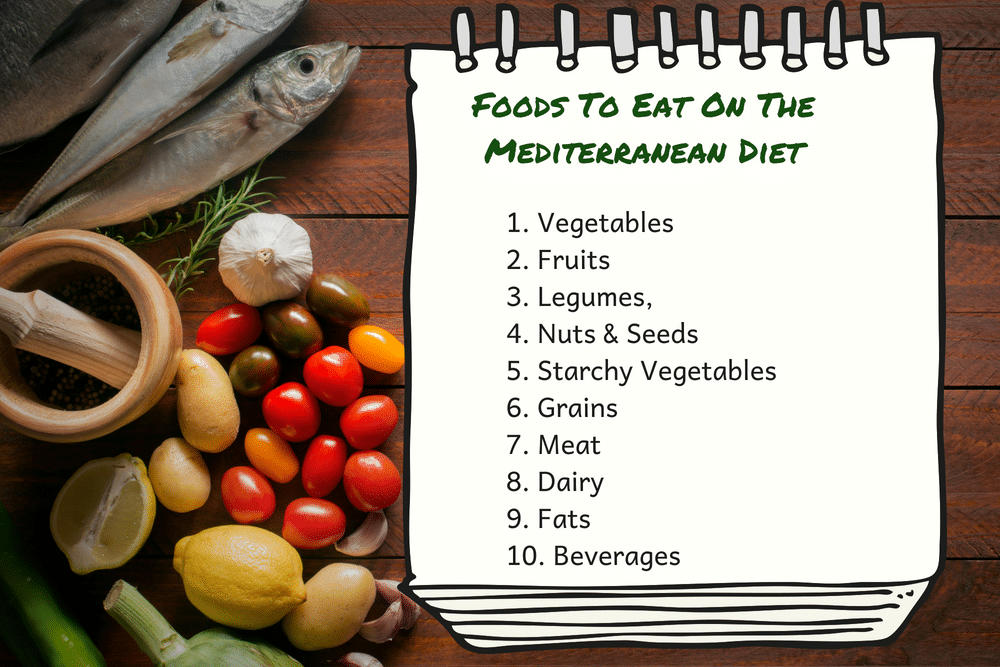
While there are no exact foods that comprise the Mediterranean diet, there are many that are included for variety based on geographical differences. It is important to note that significant variations exist on the Mediterranean diet based on which country you are from, so it’s not uncommon for parts of Greece to have cuisine that is vastly different from that of Italy.
Regardless, the foods included below emphasize the principles of the diet.
1. Vegetables
Most vegetables are fair game and acceptable on the Mediterranean diet. Great choices include kale, tomatoes, spinach, carrots, cauliflower, Brussels sprouts, lettuce, onions and even eggplant which is extremely popular in Greek cuisine.
2. Fruits
Apples, oranges, various berries, grapes, melons, avocados, and olives are great choices on the Mediterranean diet. Tropical fruits are not very common, but some are still acceptable.
3. Legumes
Peanuts, beans, peas and assorted other pulses are all acceptable on the Mediterranean diet.
4. Nuts And Seeds
Macadamia nuts, almonds, cashews, and walnuts, in addition to seeds such as Chia, flax, sunflower, and pumpkin are great choices to consumer as snacks or as an accompaniment to primary meals.
5. Starchy Vegetables
These include Sweet potatoes, yams, and turnips. White potatoes are generally acceptable, but based on the fact that they are considered anti-nutrient foods, it would be better to avoid them in the interest of nutrition.
6. Grains
The Mediterranean diet consumes a fair amount of grains, but preferably whole-grain products. These can include steel cut oats, brown rice, corn, barley and whole wheat products including bread and pasta. Whole wheat products ensure high fiber content is achieved in your diet, but may not be suitable for everyone, especially if gluten allergies are present.
7. Meat
Poultry, such as chicken and turkey are the primary sources of meat besides fish. The diet is seafood heavy, in that sardines, shrimp, oysters, crabs, and mussels are also very common foods to consume. Eggs of chicken, turkey and even quail are also regularly consumed.
8. Dairy
Full-fat dairy products including cheese, a variety of natural yogurts and to a lesser extent full-fat milk are acceptable, but should be consumed in moderation. Again, these can possibly be excluded based on personal preference and if you have pre-existing dairy allergies.
9. Fats
The primary cooking fat in the Mediterranean diet is extra virgin olive oil. Extra-virgin olive oil is extremely rich in monounsaturated fatty acids, which can explain why the diet is extremely high in this nutrient. Fatty fish are also excellent sources of monounsaturated fats. Other common accompaniments can include avocado oil, and only occasionally coconut oil (owing to its high saturated fat content).
10. Beverages
The common denominator amongst all healthy diets when it comes to beverages is water. The Mediterranean diet also allows tea or coffee, and wine is a great and advised beverage as well. However, wine consumption should be limited to around one glass per day.
Wine can be considered optional as well, especially if you do not consume alcohol of any sort. Tea and coffee should be consumed as is, and not sweetened.
Foods To Avoid On The Mediterranean Diet
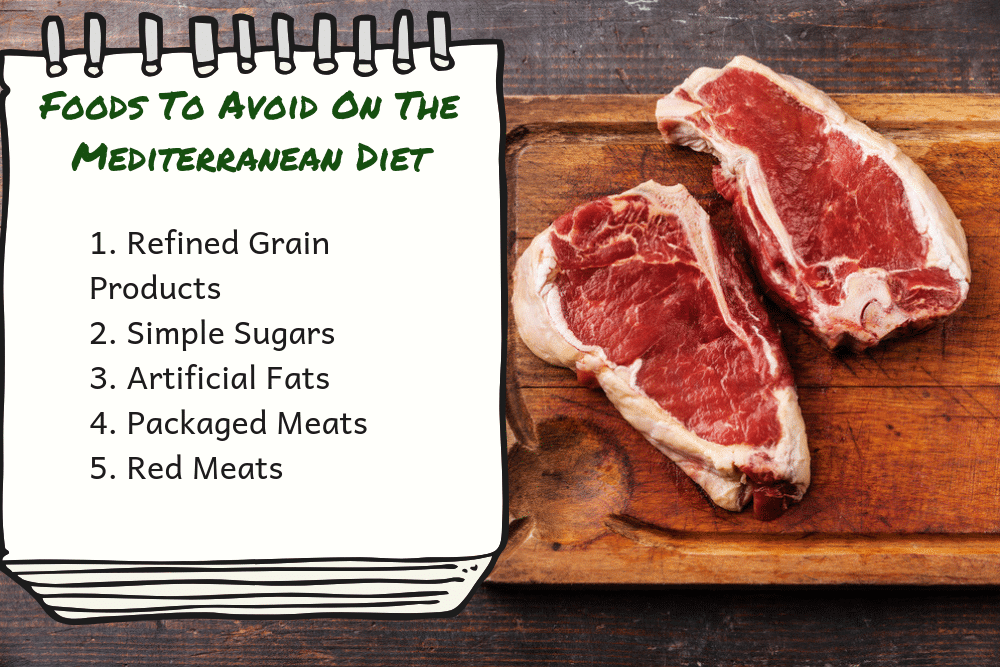
Most vegetables and fruits are completely acceptable on the Mediterranean diet, so for all intents and purposes, we do not need to include any of them on this list, except for white potatoes which we have already mentioned.
You will find the Mediterranean diet is not extremely restrictive about what you cannot consume but does share similarities with many diet lifestyles as to what it considers off-limits. You should avoid the following in order to enjoy maximum benefits from the Mediterranean lifestyle:
1. Refined Grain Products
These include bleached and white flour bread and pasta, in addition to quick preparation oats or other grains that have undergone preprocessing.
2. Simple Sugars
These include many sugary treats, including soda, various candies, ice cream, table sugar and confectioners’ sugar. Fruit juices should also be excluded since even though they contain natural fruit extracts, unholy amounts of sugar are added to make them appealing for mass-market consumption.
3. Artificial Fats
These include margarine, canola oil, soybean oil, along with trans-fat products such as pastries, and many packaged savory products.
4. Packaged Meats
These can include canned or processed meats of any kind, such as sausages, bacon and various luncheon meats. These types of meat usually contain high amounts of preservatives such as nitrates, which are highly inflammatory and can contribute to the development of metabolic disorders and even cancer.
5. Red Meats
These include primarily beef and pork products, which are avoided owing to high saturated fat content. They can still be consumed occasionally in specialist dishes, but they are generally left out of the diet in favor of heart-healthy animal protein sources.
How to Successfully Move to The Mediterranean Diet
While you can start adopting the Mediterranean diet now, it’s a good idea to do prior research to understand the ins and out of the diet, so that you are not caught off guard if adversity hits. Here are some great tips to help you successfully live the Mediterranean lifestyle, and experience its wondrous benefits on health:
1. Eat Three Meals Per Day
Yes, you read that correctly. In general, the Mediterranean diet does not make provisions for snacks, though they aren’t off-limits per se. But instead of waiting around to see if cravings hit, a good place to start is to ensure that each of your primary meals are large enough to satisfy you and prevent hunger for a number of hours.
For instance, you should ensure each meal contains a generous amount of vegetables, which will be responsible for a large aspect of satiety you experience. Secondly, ensure you have a decent amount of protein at each meal, along with healthy fat. This can include consuming an avocado or half of it with a meal, or if your meal would not go well with it, ensuring you drizzle it with an olive oil based dressing.
Complementing your meal with pasta can help make the meal more filling, or in the case of breakfast, whole-wheat bread. Do not skimp on your primary meals, or the hunger you are likely to experience midway through the day can easily derail your plan.
Which brings us to tip number two:
2. Have Nuts And Seeds With An Optional Piece Of Fruit As A Snack
While you can include nuts and seeds to complement the main courses, should hunger strike you in between meals, a great way to shut them down fast is to have a small amount of healthy nuts and seeds. You can even fortify it with a bit of yogurt and fruit, though that is best reserved for dessert.
Regardless, the goal is to ensure you are still consuming healthy foods and do not inadvertently seek out junk at these intervals.
3. Relish Your Meals
Interestingly, one reason the Mediterranean diet may be effective for weight loss is not because of the presence of high-fiber in the diet, but rather the time it takes to complete a meal.
It appears that consuming food slower allows the brain to more efficiently send signals that you are full, in contrast to hurriedly gobbling down everything in front of you. This means that meals may be larger and longer, but chances are you won’t be able to complete them anyway.
Mediterranean Diet – Summary
Scared of commitment? You’re in luck because the Mediterranean diet does not have to be an all or nothing type of diet. You can start making smaller changes now, which lend themselves to when you are fully committed to following it.
For instance, start out by swapping artificial vegetable oils most people use with olive oil for cooking. That alone will help to increase the amount of monounsaturated fat you get in your diet to a significant degree. Next, reduce consumption of red meat, and instead eat more fish and poultry products. Free range of grass-fed animals are the best, as their meats contain higher amounts of the healthy fats CLA.
Last but not least, keep in mind that in addition to dietary guidelines outlined, people of the Mediterranean are involved in significantly more physical activity than we are today. This means get up and walk more, even if it means just a walk or two around your block after work. Every little bit counts, and when combined with a healthy Mediterranean style diet, you can count on living a longer and more fulfilling life.



Join the 7‑Day “Better Gut” Plan
Pop in your email and we’ll send Lesson 1 + the printable list.






